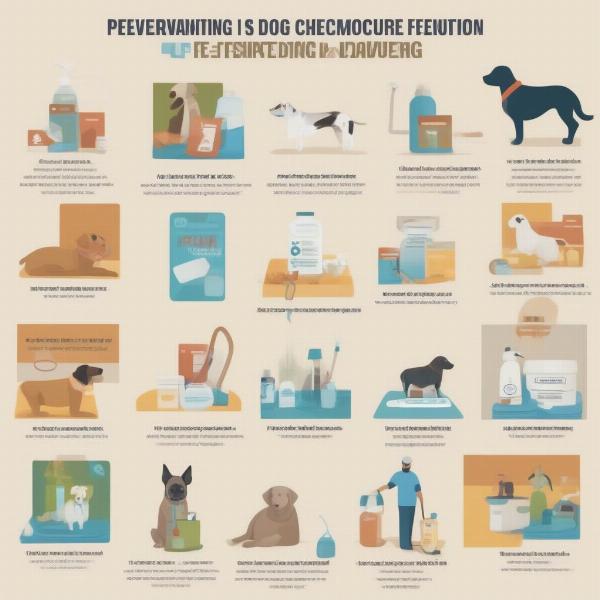Worms are a common problem for dogs of all sizes, but large breeds have specific needs when it comes to worming. Choosing the right large dog worming tablets is crucial for maintaining their health and preventing infestations. This guide will explore the different types of worms that affect large dogs, the importance of regular worming, how to choose the best product, and answer frequently asked questions.
Understanding Worm Infestations in Large Dogs
Large dogs, due to their size and often adventurous nature, can be particularly susceptible to intestinal worms. These parasites can cause a range of health issues, from mild discomfort to severe illness. Common types of worms include roundworms, tapeworms, hookworms, and whipworms. Each type has its own life cycle and associated symptoms. Understanding the specific threats to large breeds will help you choose the most effective large dog worming tablets.
Symptoms of Worm Infestations
While some dogs may show no outward signs, common symptoms of worm infestations include:
- Vomiting
- Diarrhea
- Weight loss
- Pot-bellied appearance (especially in puppies)
- Lethargy
- Coughing (especially with lungworm)
- Scooting or rubbing their rear end on the ground
If you observe any of these symptoms, consult your veterinarian immediately. They can perform a fecal examination to diagnose the type of worm and recommend the appropriate large dog worming tablets.
Choosing the Right Large Dog Worming Tablets
Choosing the correct worming medication is crucial for effective treatment. Not all wormers are created equal, and some target specific types of worms. Consider these factors when selecting large dog worming tablets:
- Weight: Accurate dosing is crucial for effectiveness and safety. Choose a product specifically formulated for large dogs and follow the weight-based dosage instructions carefully.
- Type of Worm: Broad-spectrum wormers are designed to treat multiple types of worms. If your veterinarian has diagnosed a specific type of worm, they may recommend a targeted treatment.
- Age: Puppies and senior dogs may require different worming schedules and dosages.
- Lifestyle: Dogs with access to wildlife or who frequently consume raw meat are at higher risk and may require more frequent worming.
Administering Worming Tablets
Giving your dog medication can sometimes be challenging. Here are some tips for administering large dog worming tablets:
- Hide the tablet in food: Conceal the tablet in a small piece of cheese, peanut butter, or their favorite treat. dog quad dewormer
- Crush and mix with food: For palatable tablets, you can crush them and mix them with wet food.
- Use a pill popper: A pill popper can help you place the tablet directly at the back of your dog’s throat.
- Follow up with a treat: Rewarding your dog with a treat after administering the tablet will create a positive association. drontal dog wormer xl
Preventing Worm Infestations
While regular worming is essential, prevention is always better than cure. Here are some preventative measures:
- Regular fecal examinations: Schedule regular vet visits for fecal examinations to detect worm infestations early.
- Proper hygiene: Clean up dog feces promptly to prevent the spread of worm eggs.
- Prevent scavenging: Discourage your dog from eating feces or scavenging wildlife.
- Flea and tick control: Some worms are transmitted by fleas and ticks, so maintaining effective flea and tick control is crucial. best wormer for small dogs
 Preventative Measures for Worm Infestations
Preventative Measures for Worm Infestations
Conclusion
Protecting your large dog from worms requires a proactive approach. Choosing the right large dog worming tablets, administering them correctly, and implementing preventative measures will ensure your furry friend stays healthy and parasite-free. Remember to consult your veterinarian for personalized advice and a tailored worming schedule. dog worming panacur
FAQ
- How often should I worm my large dog? Most veterinarians recommend worming adult dogs every three months.
- Are all worming tablets safe for all breeds? No, always choose a wormer specifically formulated for large dogs and follow the dosage instructions carefully.
- Can humans get worms from dogs? Yes, some types of worms can be transmitted from dogs to humans, so proper hygiene is essential.
- What if my dog vomits up the worming tablet? Contact your veterinarian for advice. They may recommend re-dosing or suggest an alternative administration method.
- Are there natural alternatives to worming tablets? While some natural remedies are touted, their effectiveness is not scientifically proven. It’s always best to consult your veterinarian before using any alternative treatments.
- Can I buy large dog worming tablets over the counter? Yes, many worming tablets are available over the counter, but it’s always recommended to consult your veterinarian to ensure you’re choosing the right product and dosage for your dog.
- What should I do if I think my dog has worms? Contact your veterinarian immediately. They will perform a fecal examination to diagnose the type of worm and recommend the appropriate treatment.
ILM Dog is your trusted resource for all things canine. We offer expert advice on dog breeds, health, training, nutrition, grooming, and much more. Whether you’re a seasoned dog owner or a first-time puppy parent, ILM Dog is here to support you every step of the way. Contact us today at [email protected] or +44 20-3965-8624. ILM Dog is dedicated to providing dog owners with reliable and practical advice, covering various aspects of canine care. Our expertise spans from breed selection and healthcare to nutrition, grooming, and product recommendations, ensuring your dog’s well-being.